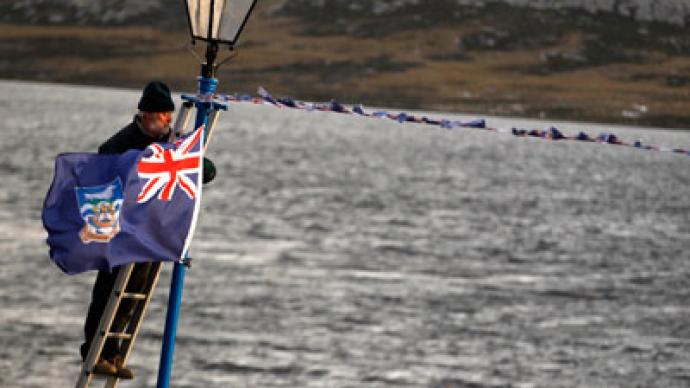A series of military options are being considered by UK defense chiefs as tension mounts between Britain and Argentina over the Falkland Islands, a report by the Sunday Telegraph claims.
Extra troops, warships and Typhoon combat aircraft could be dispatched to the islands if needed, ahead of the March 11 referendum on the island’s future, the newspaper claims, citing sources in Britain’s military.The Permanent Joint Headquarters in Northwood, north-west London is also reportedly considering a ‘show of force’, including conducting naval exercises in the South Atlantic. These could include the deployment of the Royal Navy’s Response Task Force Group, a flotilla of destroyers, a frigate, a submarine and Royal Marine commandos. A more costly alternative would be to deploy the British Army’s 16 Air Assault Brigade, an airborne task force with more than 8,000 soldiers from five infantry battalions, including the 2nd and 3rd battalions of the parachute regiment. The Paras, as they are known, have just completed training exercises in Spain, which covered rapid engagement with conventional armies, not an area of training that most army units have undergone in the past decade of fighting in Iraq and Afghanistan. The report alleged that some members of Three Para have recently returned from the Falklands as part of a routine deployment and would be well-placed to brief troops deploying there at short notice. Despite the increasingly hostile rhetoric between London and Buenos Aires, the British government does not believe that Argentina currently has the political will or the military capability to recapture the islands, the newspaper said. But the prime minister has told his defense chiefs, according to the Sunday Telegraph, that the UK must be prepared for every eventuality.Last week the PM announced on a BBC TV show that the UK is ready to defend the Falklands if necessary. “Of course we would [defend the territory], and we have strong defenses in place on the Falkland Islands, that is absolutely key, that we have fast jets stationed there, we have troops stationed on the Falklands,” he said. The March referendum is expected to receive a 100 per cent ‘yes’ vote to the question: ‘Do you wish the Falkland Islands to retain their current political status as an overseas Territory of the United Kingdom?’ All of the 3,000 islanders are British. The Sunday Telegraph reported claims that intelligence chiefs have warned the prime minster that the Argentinians may carry out an aggressive ‘stunt’ at the same time as the islanders hold their referendum. For example, a small raiding party might plant the country’s flag on the islands or the Argentine navy might conduct a harassment campaign against the Falklands’ fishing fleet, or disrupt British oil and gas exploration. If the Royal Navy was then ordered to intervene, such a situation could potentially escalate into an exchange of fire. “Britain needs to be in a situation to respond very quickly to a whole series of threats – that is why we have contingency plans. Our posture has not changed, but neither are we complacent. That is quite normal, commanders like to be two steps ahead rather than two steps behind,” a senior defense source told The Telegraph. Britain’s current defense of the islands is made up of 1,500 soldiers, four RAF Typhoon jets and anti-aircraft and artillery batteries.A Royal Navy destroyer, currently HMS Edinburgh, is always on duty in the South Atlantic, alongside the patrol ship HMS Clyde and the ice patrol ship HMS Protector. However, privately British defense chiefs have been warning that in the event of a full-scale Argentinian invasion of the islands, Britain would be powerless to recapture them. General Sir Mike Jackson warned in January last year that the UK would not be able to retake the islands if they were captured by Argentine forces. “"What if an Argentinian force was able to secure the Mount Pleasant airfield? Then our ability to recover the islands now would be just about impossible. We are not in a position to take air power by sea since the demise of the Harrier force,” he told the Telegraph. A comparison between the capability and size of the UK’s armed forces in 1982, when they retook the islands in a two month military campaign, and of today reveals that Britain may not be able to project sufficient airpower to sustain military action so far from the UK. In a separate development on Saturday two British P&O cruise ships have shelved plans to dock at three Argentinian ports because of growing tensions over the Falklands. The two liners Arcadia and Adonia are also visiting Port Stanley, the capital of the Islands, as part of their round the world cruises next week. Recently, Argentinian port authorities have refused ships that have visited the Falklands permission to dock.Despite being defeated by the British task force when General Leopold Galtieri military junta tried to retake the Islands in 1982, the majority of Argentinians support their country’s claim over the islands. Opinion polls suggest that about two-thirds of Argentinians support their president’s Cristina de Kirchner’s position on the Falklands.The Falklands dispute has renewed in recent years – in 2007, Argentina reasserted its claim over the islands. Kirchner’s position has hardened since the discovery of potential oil reserves off the islands, as well as last year’s 30th anniversary of the Falklands War.

